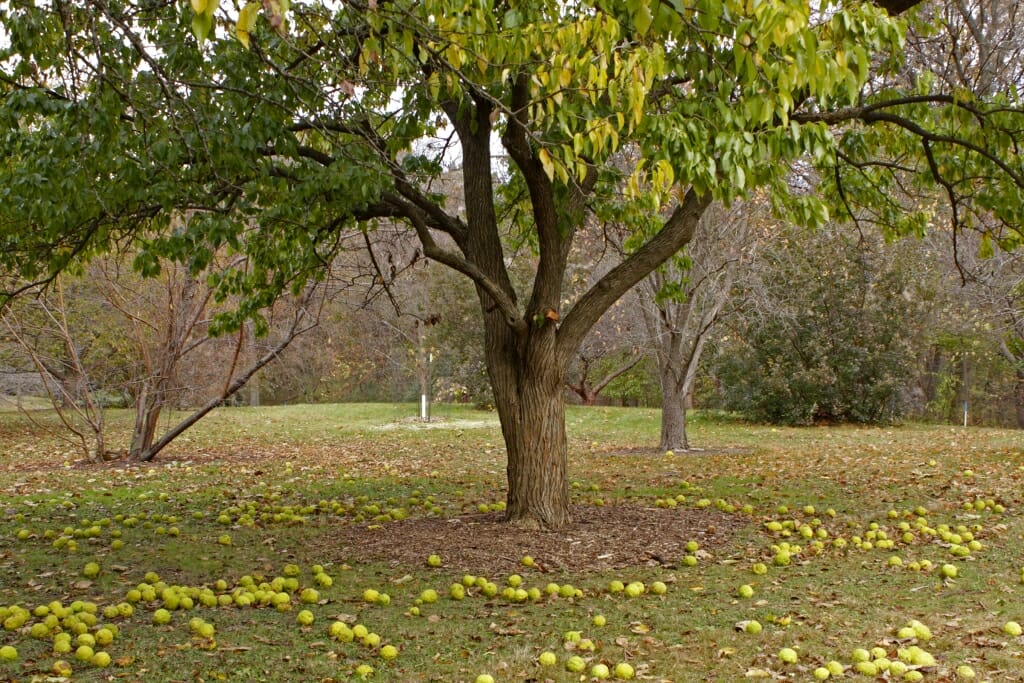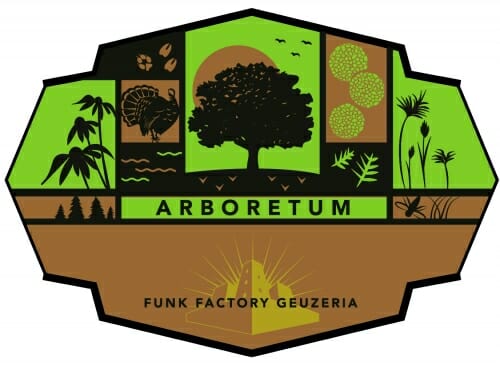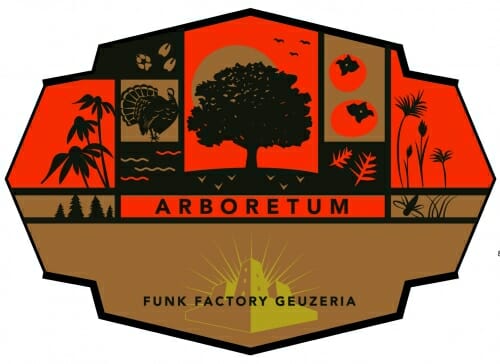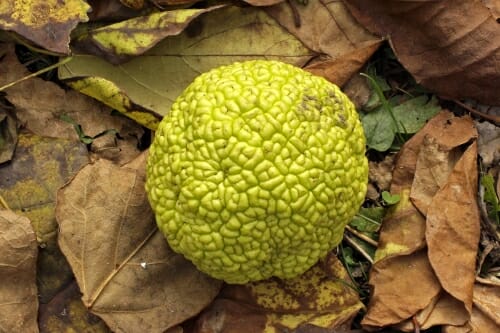Arboretum brews up partnership to turn unlikely fruits into local beer

Osage oranges from Longenecker Horticultural Gardens are a key ingredient in a new locally brewed beer.
Rock-hard, lumpy, and larger than a softball, pale-green Osage oranges seem to be no good for anything but a twisted ankle.
But to Levi Funk, they smelled like opportunity.
On a walk through the University of Wisconsin–Madison Arboretum’s Longenecker Horticultural Gardens last fall with his family, Funk picked up the strange fruit and noticed a surprisingly pleasant floral, citrusy scent. Funk immediately thought of the potential uses at Funk Factory Geuzeria, the sour beer brewery near the Arboretum that he owns.

The surprisingly pleasant floral, citrusy scent of Osage oranges made its way into a unique beer produced with this strange fruit. Courtesy Funk Factory
“We are constantly on the lookout for fruit — and fruit closer to our backyard,” says Funk.

One of the beers was brewed with American persimmons from the Arboretum, which Levi Funk describes as aggressively astringent. Courtesy Funk Factory
So Funk and his wife Amanda reached out to David Stevens, the curator of Longenecker. They asked if they could get some Osage oranges to make a test batch of beer. While the Arboretum is a research site devoted to maintaining natural cycles — including letting fruit fall where it may — the curated Longenecker Horticultural Gardens are more ornamental and less wild.
“We’re a little different here but we still don’t want to encourage people to pick up and harvest things,” says Stevens, who liked the idea and gave Osage oranges to Funk Factory. “I thought it fit in with what we are trying to do, which is to advance knowledge of our natural resources.”
The first two beers out of this collaboration will be on tap at the Funk Factory taproom at 1602 Gilson St. for a tasting event on Sunday, May 6 at 1 p.m. and 3 p.m. Arboretum staff will join to discuss the fruits and the garden’s practices. A portion of the proceeds will benefit the Arboretum. In addition to brewing with Osage orange, Funk Factory produced a beer with American persimmons from Longenecker.

Osage orange in Longenecker Horticultural Gardens. : The hard, lumpy and large Osage orange fruit has rarely found productive uses, until a local brewery turned it into beer. Photo by Susan Day
“It was quite interesting in a good way,” says Stevens, who got to try an early batch of the Osage orange beer and describes it as having “citrusy overtones.” “I think it lends itself well to the sour format of this beer style.”
Originally native to Texas and Oklahoma, the Osage orange spread throughout the Midwest as a hedgerow plant, says Stevens, who worked at a botanical garden in Texas earlier in his career.
“To my knowledge the fruit had never been used for anything,” he says.
Funk Factory already works with local farmers to source a wide variety of fruits from Wisconsin, including raspberries, currants and tart cherries. But it’s hard to get much more local than the Arboretum, which is just on the other side of South Park Street from the brewery.
“There’s a sense of location about a lot of our beers already. So being able to connect that with the Arboretum was just a natural fit,” says Funk. He’s looking to partner with Stevens and the Arboretum again in the future to brew larger batches and consider other fruits as they’re available.
He’ll have a number of options to consider. Longenecker Horticultural Gardens boasts ornamental pears, the strangely custard-like paw paws, and crabapples, which Stevens has considered collecting to make hard cider. Those are just a few of the 2,500 different species in Longenecker, which also has one of the largest displays of lilacs in North America.
The large collections, the fruit and, yes, the beer are all opportunities that Stevens taps into to share what the Longenecker Horticultural Gardens has to offer.
“Especially in the growing urban and younger demographic of Madison, I thought it was good vehicle to get our message out there and to get people excited and interested in what we do here,” he says.




